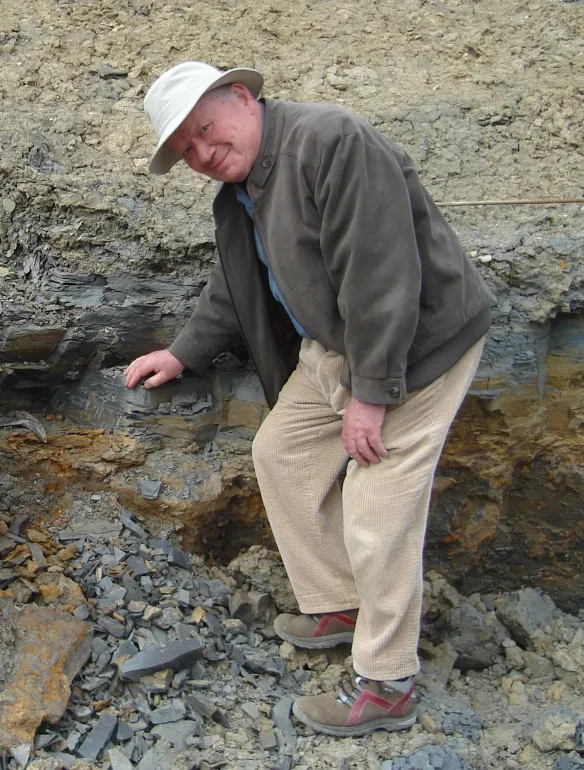Arnold Zeiss obituary
Arnold Zeiss (1928-2020)
On Easter Sunday (12 April) 2020, the first chairman and honorary member of ISJS, Prof. Dr. Arnold Zeiss, sadly died at the age of 91.

Arnold Zeiss explores the Lower / Upper Sinemurian boundary near Coburg in Franconia in 2008 Photo: E. Mönnig
Arnold Zeiss was born in Munich on October 23, 1928. His father was the well-known medieval archaeologist Hans Zeiss (1898–1944), second director of the Roman-Germanic Institute in Frankfurt and from 1935 Professor at the University of Munich. Arnold therefore spent his infancy in Frankfurt and his school days in Munich. In 1944 Arnold had to interrupt high school and was drafted as an air force helper into an anti-aircraft battery. The same year his father fell on the Eastern Front in Romania after being drafted as a captain in 1942.
After the war Arnold returned to Wilhelms-Gymnasium and graduated from high school in 1948. From high school he went to the University of Munich first as a volunteer, and then, in 1949, he was accepted as a student to study geology and paleontology. He also spent a short time at the University in Wurzburg (1951–1952). While still studying, Arnold started his thesis and the topic of this determined his future academic career as an ammonite specialist. The Bavarian State Collection had acquired an ammonite collection from the Blumberg iron ore deposit in 1950, which Arnold examined under the direction of Richard Dehm. Two frequently cited publications resulted from this study: ‘On the stratigraphy of the Callovian and Lower Oxfordian near Blumberg (South Baden)’ (1955) and ‘Hecticoceras and Reineckeia’ in the Middle and Upper Callovian from Blumberg (South Baden)’ (1956). In addition, his diploma thesis covered the Tertiary and Quaternary in the vicinity of Trifters. He completed his diploma and doctorate in 1956.
At that time, the then director of what is now the Geozentrum of Friedrich-Alexander Universität Erlangen-Nürnberg, Prof. Dr. Bruno von Freyberg, was carrying out an extensive mapping of the Franconian Jura. For this he needed an expert on Jurassic ammonites, and this led to Arnold getting a job as a research assistant at the University in 1956. After completing the habilitation process Arnold received the venia legendi for paleontology in 1967. In the meantime the paleontological department had been developed into a paleontological institute, where Arnold Zeiss was first employed as a scientific council, then as an associate professor and finally as a scientific council and professor. In 1978 he received the title Extraordinarius. He retired in 1993.
Arnold Zeiss’s scientific interest focused on the stratigraphy of the Jurassic system, where he developed into a sought-after ammonite specialist, especially on the Upper Jurassic. Numerous publications testify to this. Other fields of research included: Jurassic stratigraphy and ammonites from Poland, Austria, the Southern Alps, Pakistan, Japan, East Africa, Canada, South America and Antarctica, Cretaceous ammonites from Regensburg and Southeast Ethiopia, and Devonian cephalopods.
Arnold Zeiss became involved in numerous scientific organizations at an early age. He was one of the participants in the Colloque du Jurassique – Luxembourg 1962 and was instrumental in setting up the ‘International Subcommission of Jurassic Stratigraphy’. At the request of Anders Martinsson he became the first chairman of this group (1978–1990). Together with Olaf Michelsen as secretary, he recruited new members, formulated a work plan and organized the first working groups. The ‘Newsletter’, which was sent to all members once a year, served to disseminate the relevant information. In 1970 he became a member of the German Stratigraphic Commission, where he served as both chair (1970–1978), and as a member of the ‘Code Working Group’, which was responsible for preparing a German guide for stratigraphic classification. A highlight of Arnold’s career was the organization of the International Symposium on Jurassic Stratigraphy, in Erlangen from 1 – 8 September 1984. At that time he showed enormous help to colleagues from East European countries and China. Jurassic geologists in Poland remember him with special gratitude, because it was through his help that they were able to maintain scientific contact during martial law in Poland and to attend the first Jurassic Congress in 1984. In 1985 the Polish Academy of Sciences named him ‘Foreign Member’.
Arnold Zeiss remained scientifically active until old age. The ‘Jurassic Family’ mourns the loss of a very popular colleague who was well known for his subtle humour.
Eckhard Mönnig, 2020
